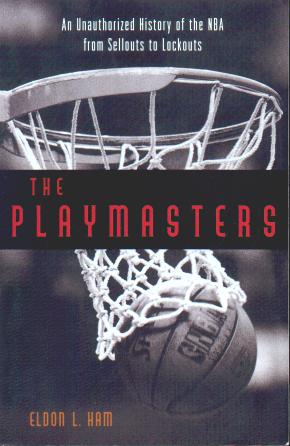By Eldon J. Ham
![]()

![]()
Ranking:
![]()
![]()
![]()
This book calls itself an unauthorized history of the NBA. The author is a sports lawyer, and when it comes to explaining the legal history of the NBA, he is brilliant. He makes plain the union/labor dispute, the 1998 lockout, the Oscar Robertson, Leon Wood, and Spencer Haywood court cases. He also explains economics behind NBA decisions, such as breaking up the Bulls championship teams. In these regards, the book is excellent and unique.
Now, the bad. The man is a Chicago homer with a capital "H." He tries to tell the history of the NBA from 1979-1998 and he tells it from memory, and his memory is lacking. In two chapters, I found 9 errors. For instance, on page 120 while recalling the 1991 finals, he said, "back in Chicago for the fifth game." The fifth game was in L.A. The Bulls had home court advantage (and he correctly refers to the series opening in Chicago), and the finals' format is 2-3-2, instead of the 2-2-1-1-1 played in previous rounds. Another error is on page 122, while talking about the 1993 playoffs, he says "Meeting last season's finalist Lakers in the first round, the Suns had their work cut out for them..." The Lakers were finalist two seasons before. The season before, they were defeated in the first round Portland went on to the finals. A more serious error can be found on page 130, where he talks about the Clyde Drexler trade to Houston, he says, "Clyde would play 35 games for Houston...complementing Olajuwon, Vernon Maxwell, Otis Thorpe (who only played in 36 games), Kenny Smith, Robert Horry, Sam Cassell, and Mario Elie." This shows that he was probably looking off something like a Sporting News NBA Guide. Otis Thorpe only played 36 games because he was traded for Drexler!!! Drexler did not complement Thorpe in Houston, he supplanted him. This style of analysis is common, as you see him refer to a team as strong, citing players on the roster, yet some of the players were minor contributors at that point in their careers (for instance, Eldon Campbell on the 1991 Lakers...and no, he wasn't using this line in context of the finals, where Campbell had a very good game 5).
He also tries to use Chicago teams (Bears, Cubs, Bulls, Blackhawks, White Sox) to illustrate points. He screws some facts with them, also, claiming that Bears assistant coach Buddy Ryan was fired (he took another job) and that linebacker Wilber Marshall and Bulls coach Phil Jackson were "dumped" (Jackson resigned and Marshall signed as a free agent). He even makes this error in non-Chicago teams by saying that Shaquille O'Neal was "shipped off to the Lakers" (p. 132), when in reality, O'Neal left as a free agent, and Orlando tried desperately to re-sign him.
While in the middle of his Bulls-love fest, he claims comparisons of the 1996 Bulls to great teams (and he lists some, from the 1960s Celtics, to the 1986 Celtics and 1987 Lakers) are unfair, yet he goes on to compare the 1960s Celtics and try to spell out an argument why the Bulls are better. He refused to compare them to the other teams he mentioned (perhaps because the Bulls are obviously inferior?), and disagrees with most experts opinions that the 1996 NBA was a watered-down league...of course, he tries to argue this on a 1960 vs. 1996 platform, instead of a 1986 to 1996 platform (must be hard justifying that one).
He also writes these passages unprofessionally, referring to the Bulls' players as "Michael", "Scottie", "B.J.", etc, instead of by their last names, as he does other players from other teams. He also takes multiple digs at Jerry Krause, sounding just like too many Bulls fans who think Krause did nothing right and Michael Jordan won in spite of him.
Furthermore, he depends too heavily on individual stats to base team judgments, usually players in the top 10 of a statistical category, while not realizing that defense cannot be measured on a stat sheet and that stats are not all-telling.
In these aspects, he comes across as a very unknowledgeable "expert." Instead, he comes off as an Ahmad Rashad clone. Fortunately, his ignorance is only flaunted in four chapters, out of 18. After spewing off his twisted recollection and love for "da Booolz", he goes back into what he does best: legal analysis, and covering the alleged conspiracies in the NBA. He concludes with the "sins" of the NBA, and he hits most of these on the head.
If you tear out 4 chapters of this book and read it, it is an excellent book. As it stands, because of its uniqueness, it's still very good. If not for the 4 chapters, this book would be 5-star quality.
Introspection: N/A
Insight: 5
History: 1946 and before to 1998
Readability: 3
The Playmasters. Eldon J. Ham. Contemporary Books. 2000.